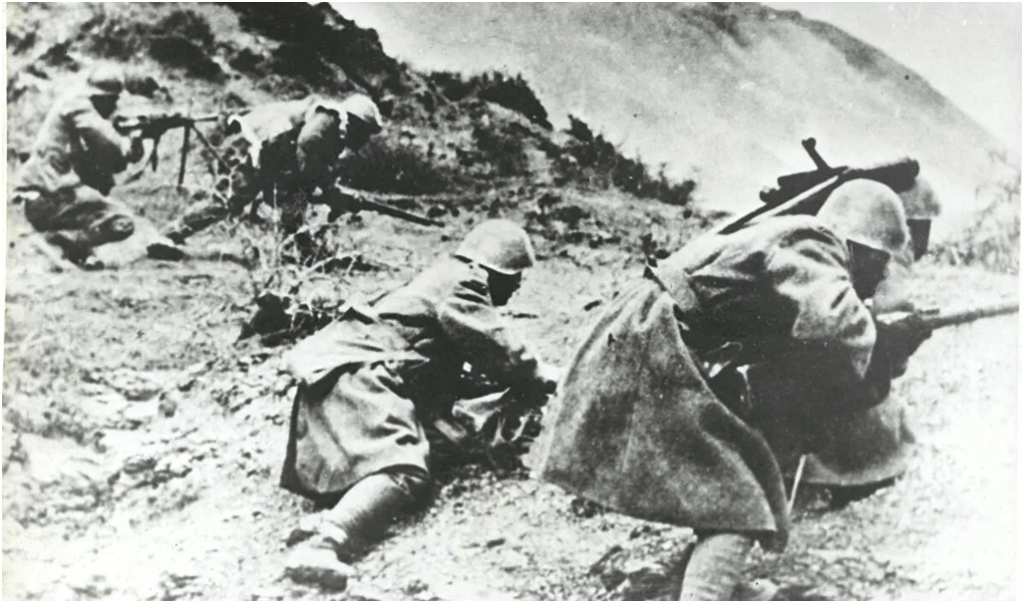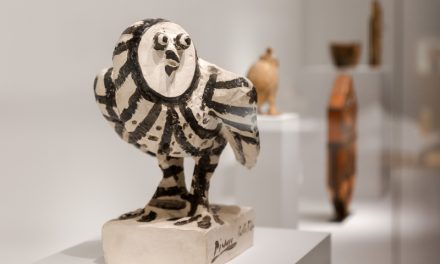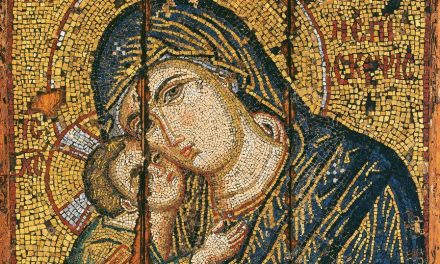October 28 is the national holiday related to the country’s participation in World War II, when, in 1940, Greece entered the war against the attack of fascist Italy. OXI-Day (also spelled “OHI” or “OCHI” Day, Anniversary of the “NO”) commemorates the rejection by the Greek government of the ultimatum made by Italian dictator Benito Mussolini, the Hellenic counterattack against the invading Italian forces at the mountains of Pindus in Epirus during the Greco-Italian War (photo above from the War Museum Athens Archive), and the Greek Resistance during the Axis occupation. The spirit of OXI Day remains a symbol of national pride and resilience in the face of oppression.
The fascist Italy ultimatum demanded that Greece allow Axis forces to enter Greek territory and occupy certain unspecified “strategic locations” or otherwise face war. It was allegedly answered with a single laconic word: “OXI”(“NO”), however, the actual reply was, “Alors, c’est la guerre” (Then it is war). In response to this refusal, Italian troops stationed in Albania, then an Italian protectorate, attacked the Greek border at 05:30 am – the beginning of Greece’s participation in World War II. On the morning of 28 October 1940, the Greek population took to the streets shouting “OXI” (“NO”).
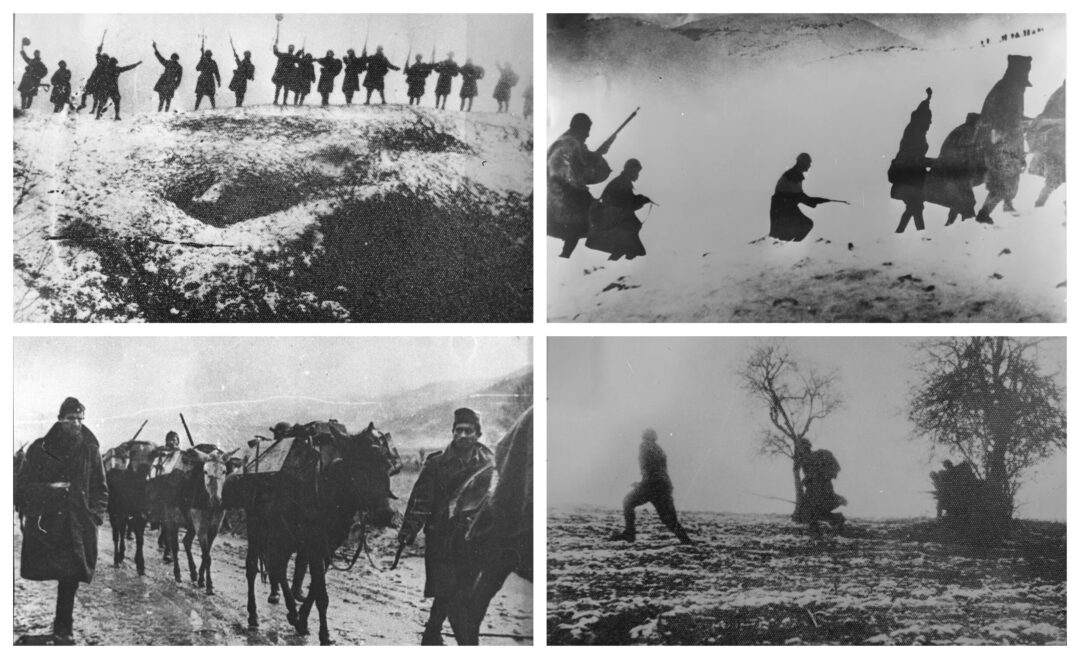
The Epic of 1940-1941 – photos from the War Museum Athens Archive
The Greek victory over the initial Italian offensive was the first Allied land victory of the World War II, and helped raise morale in occupied Europe. Greece resisted the Axis powers for over 185 days from October 28, 1940 – April 31, 1941. In the following period the Greek Resistance, one of the most effective resistance movements in Occupied Europe, was formed. Their efforts included sabotage, intelligence gathering, and aiding Allied forces, contributing significantly to the eventual liberation of Greece in 1944.

“Greece Fights On” by E. McKnight Kauffer (Publisher: Greek Office of Information – Washington D.C., 1942, V&A Museum in London
ERTFLIX International and Voice of Greece Honor the Anniversary of the OXI Day
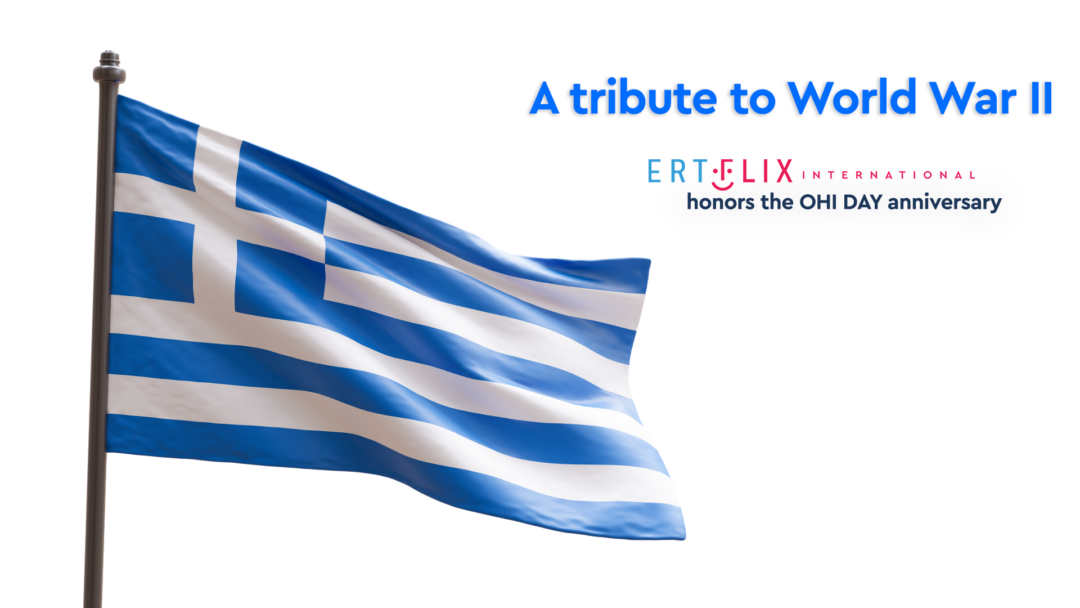
ERTFLIX International commemorates the anniversary of October 28, 1940, by showcasing films, series, documentaries, and historical programs from ERT’s archive. This special tribute offers rich content about the dark period of World War II, which left a profound mark on history.
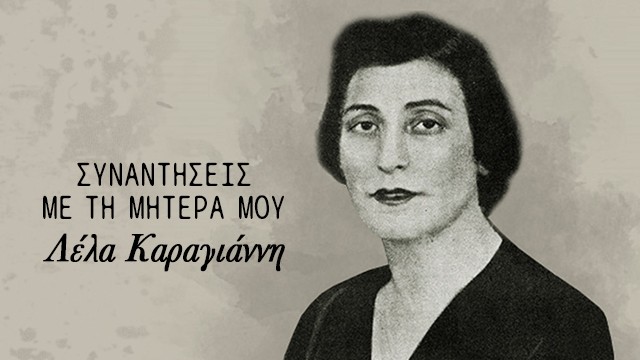
“Meetings with My Mother, Lela Karagianni”: Documentary, directed by Vassilis Loules, Moments from the actions and personality of Lela Karagianni, a legendary figure of the Greek Resistance (with English subtitles)
“Crucial Moments”:Drama ,directed by Manousos Manousakis, adaptation of Galatia Kazantzakis’ novella (With English subtitles)
Greek cinema: “Betrayal “| War Drama, Greece 1964 – “Hands Up Hitler” | Drama, Greece, 1962 – “A Hero in Slippers” | Comedy, Greece 1958 – “The Last Prisoner” | Drama, Greece 1970
Fiction series: “Invalids and Wayfarers” |Period drama, directed by Christos Paligiannopoulos
Documentaries: “If We Survive, We Will Have Stories to Tell” | Documentary, directed by Kostas Machairas
Programs from the ERT archive: “Music Night: ‘Songs of the 1940s’ “| Music program, 1976 (ERT Remembers) – “Monday Theater: The Germans Are Back “| Comedy, Greece 1977 (ERT Remembers)
For more information please visit ERTFLIX International website.
ERTFLIX International is the streaming platform of the Hellenic Broadcasting Corporation (ERT), offering a wide range of content for Greek audiences worldwide. Launched to promote Greek culture, heritage, and entertainment, ERTFLIX features a diverse selection of films, documentaries, series, and children’s programming. With an international focus, it allows users outside Greece to enjoy a rich array of programming that highlights Greece’s vibrant culture and history. Visit www.ertflix.com or download the ERTFLIX app and click on Sign up.
Voice of Greece, ERT’s global radio station, will adjust its programming starting Sunday, October 27, to participate in and highlight the commemorative events of Greek expatriates through live connections with expatriate communities and Greek educational institutions around the world. Teachers, professors, students, and leaders of expatriate organizations will be featured on Voice of Greece, placing special emphasis on the anniversary while also stressing the importance of peace globally. How to tune in to Voice of Greece: Through the ‘Voice of Greece’ mobile app, online at vog.ert.gr and www.ertecho.gr, via the ERTFLIX app.
Alexandros Alexandrakis: the painter who captured the Epic of 1940-1941
Alexandros Alexandrakis (1913-1968) was a Greek painter renowned for his dynamic representations of the Greco-Italian War of 1940. He studied painting at the Athens School of Fine Arts from 1931 to 1937 under Spyridon Vikatos and Umvertos Argyros and engraving under Yannis Kefalinos. While still a student, he contributed as a cartoonist for Ethnos newspaper. During the 1940 war, he served as a soldier on the front lines in the mountains of Epirus, capturing his experiences in a series of drawings that he later transformed into oil paintings. The result of this activity is his book “This is how we fought 1940-1941”, which received the Athens Academy Award. In 1980, the National Gallery – Alexandros Soutzos Museum held a retrospective exhibition of his work.
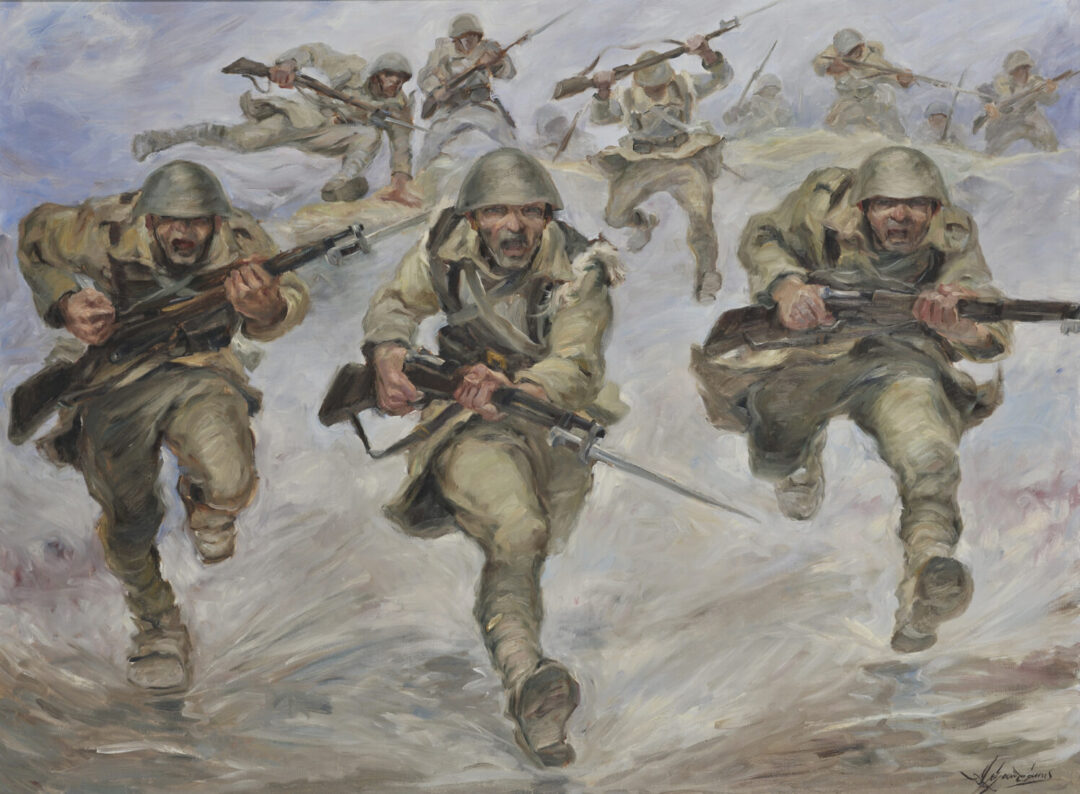
Alexandrakis Alexandros (1913 – 1968), Capturing enemy positions (Shouting “Aera!”), Oil on canvas, 110 x 150 cm, donated by the artist’s family, National Gallery-Museum of Alexandros Soutsou
Political cartoons to bolster the war effort
Political cartoons were a significant aspect of war propaganda during World War II, playing a crucial role in shaping public opinion. In Greece, from the winter of 1940 to 1941, newspaper front pages prominently featured two main themes: developments at the front lines and the daily cartoon. As part of the broader artistic mobilization to support the war effort, Greek cartoonists used satire to respond to the invasion. Their compositions often depicted desperate Italian soldiers facing off against proud Greek soldiers (euzones), delivering pointed critiques of the invaders. Through humor, these cartoons sought to bolster morale and encourage the civilian population.
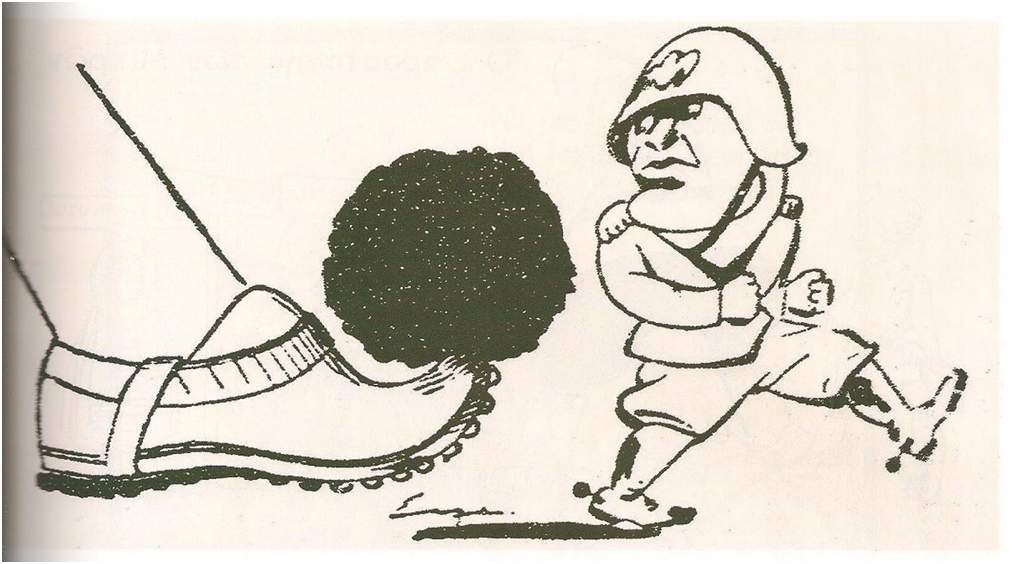
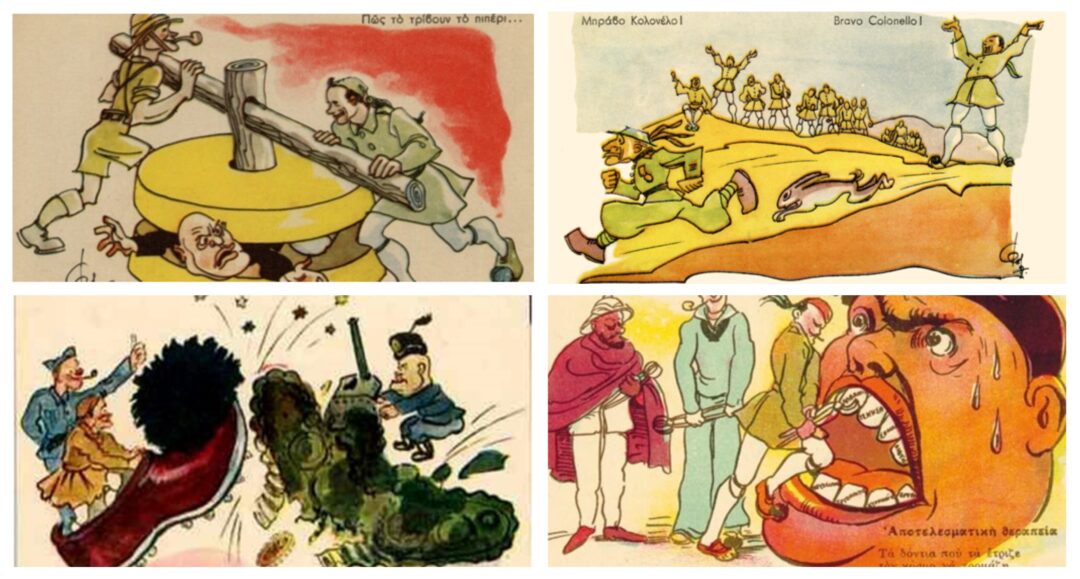
Pablo Picasso: A donation honoring Greek Resistance during the Nazi occupation
Painted by Pablo Picasso in 1939, “Female Head” was donated by the artist to the Greek people in honor of its brave resistance during the Nazi occupation; it formed part of the French Artist’s Donation, made on the initiative of the Milliex couple in the aftermath of the War. It is a portrait of the photographer Dora Maar, Picasso’s companion between 1936 and 1943 (Source: National Gallery-Museum of Alexandros Soutsou). The donation symbolizes solidarity and admiration for Greece’s resilience in the face of oppression, showcasing the enduring power of art to connect cultures and commemorate shared struggles.
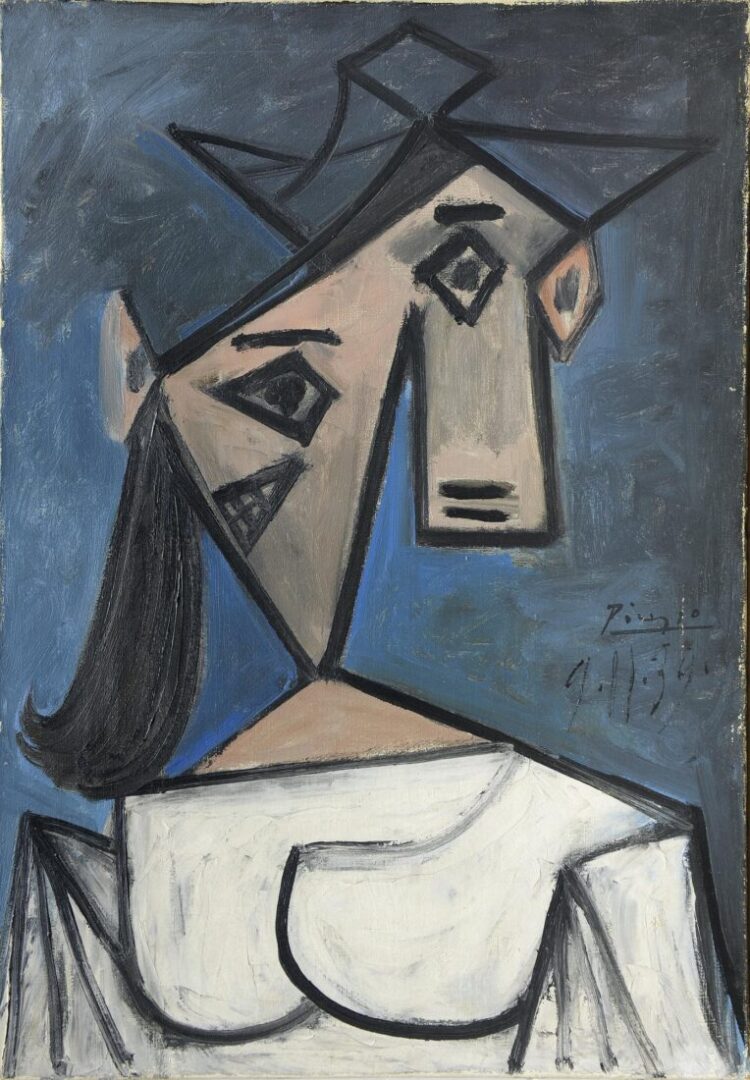
Picasso Pablo (1881 – 1973), Woman’s Head, 1939’ Oil on canvas, 56 x 40 cm, donated by the artist, National Gallery-Museum of Alexandros Soutsou
I.A.
TAGS: October 28 | OXI Day

